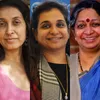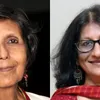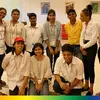[Human Rights Day] Meet the women fighting for human rights in India
In a world that thrives on societal divides, working on achieving equality can be challenging. On Human Rights Day, meet these five women who are fighting for human rights across groups.
Every year, December 10 is observed as Human Rights Day, the day in 1948 when the UN General Assembly adopted the Universal Declaration of Human Rights (UDHR) - a comprehensive document that talks about the rights everyone is entitled to as a human being.
In India, and across the world, the past year has been all about standing up for the rights of groups that face structural inequality.
Here are five women fighting for human rights across groups in India that you need to know about.

(L-R) Shaheen Mistri, Nandita Gandhi, Nandita Shah, Kriti Bharti, Neelam Jain
Shaheen Mistri
According to data from the International Labour Organisation (ILO), over 10 million children in India take part in different forms of child labour. Additionally, more than 42 million children don't go to school.
The issue of child labour is often overlooked, and millions of children continue to be exploited and lose the opportunity to lead better lives.
Social activist Shaheen Mistri has been determined to make a difference in as many lives as she could.
In 1991, she started the Akanksha Foundation, a non-profit that equips children from low income communities with education and other skills. The Foundation has 21 schools across Mumbai and Pune, with over 9,000 students and more than 500 educators.
She also founded Teach For India (TFI) in 2008, another non-profit that focuses on building a network of teachers for children from disadvantaged backgrounds. Currently, it has over 1,000 teaching Fellows across seven cities.
Nandita Gandhi and Nandita Shah
At the protests against the court verdict on the rape of a young tribal girl in 1972, were two young women, Nandita Shah and Nandita Gandhi, who met and became friends.
The duo, full of determination to make the lives of women in the country better, and empower them to lead successful lives, decided to launch Akshara Centre in 1995.
For 25 years, the Mumbai-based non-profit has been financially aiding young women from low income backgrounds, and encouraging them to pursue higher education.
It also conducts programmes for young men, to sensitise them on gender inequality and how they can be better allies to women.
The organisation claims to have financially supported the higher education of 5,000 young women, and enrolled 25,000 young men as "gender champions" over the years.
Akshara Centre has also recently contributed to a gender chapter in the new Mumbai Development Plan, making it inclusive and ensuring land reservations for amenities and services for women including multipurpose housing, child care and senior citizen care centres, hawking space, and increased public toilets.
In a previous interview with HerStory, Shah and Gandhi spoke about the changes they have seen since they started out:
"We have spent our entire lives working to change the lives of women and we are constantly asked if we see change. Although gender equality is not here as yet, the biggest change is the shift in blame. The silence around violence has broken, and fingers are now pointed more in the direction of the accused rather than a survivor."
Neelam Jain
Many transgender people in India are often denied employment in the organised sector because of their identity and the lack of access to quality education.
Aiming to make a difference and help the transgender community find mainstream jobs, Neelam Jain founded PeriFerry in 2017.
The Chennai-based organisation gives equal employment opportunities for many in the community. It helps place transgender people in organisations that give them secure jobs, and offers them free training across various skills like communication in English, the basics of operating a computer, etiquette, and grooming.
PeriFerry has helped place over 85 transgender people at companies of both Indian and foreign origin. It also conducts sensitisation workshops at the employer's premises to facilitate a safer and more inclusive workforce, and conducts routine follow-ups for at least six months to ensure employer and employee satisfaction.
Through PeriFerry, transgender people are able to work in fields like software, HR, graphic design, accountancy, tech support, hospitality, food delivery, and make-up.
In a previous interview with HerStory, Neelam said,
"A large portion of the Indian trans community depends upon begging and/or sex work to earn their daily livings. Steady mainstream livelihoods hold the key to change this picture and only accessible education, non-discriminating employment opportunities can grant access to that key."
Kriti Bharti
According to a report by Unicef in 2017, one in three child brides live in India - that's 33 percent of the world's population of child brides. Despite child marriage being outlawed in the country, India is ranked fifth in the list of countries with the highest rates of child marriage, with 58 percent of girls being married below the age of 18.
Making a difference in the lives of thousands of children and young women, is Kriti Bharti, the Founder of Saarthi Trust - established in 2011.
Through Saarthi Trust, Kriti has been stopping and annulling child marriages and rehabilitating the rescued children so that they can be eased into society again.
The activist, who hails from Rajasthan, has annulled over 30 child marriages and stopped over 850 more. By the year 2015, she had also rehabilitated more than 6,000 children and 5,500 women.
Although Kriti has faced hundreds of death threats while trying to rescue children and convince village elders to stop such marriages, she has never given up.
Her team also organises camps in villages to discuss the ill-effects of child marriage, often inviting older women who were married as children to share their experiences, and empowering young girls to fight for their freedom.
(Edited by Rekha Balakrishnan)


![[Human Rights Day] Meet the women fighting for human rights in India](https://images.yourstory.com/cs/4/ce3a22c0b0f611e8ac49d10dfcb04889/humanrightsday1575886157618png?mode=crop&crop=faces&ar=2%3A1&format=auto&w=1920&q=75)



![[Year in Review 2019] 10 powerful social media posts by women in 2019](https://images.yourstory.com/cs/4/ce3a22c0b0f611e8ac49d10dfcb04889/socialmediawomen1575525147759png?fm=png&auto=format&h=100&w=100&crop=entropy&fit=crop)
![[Year in Review 2019] These are the 10 stories that touched our hearts and inspired us](https://images.yourstory.com/cs/4/8e7cc4102d6c11e9aa979329348d4c3e/Untitleddesign691575019463033png?fm=png&auto=format&h=100&w=100&crop=entropy&fit=crop)




